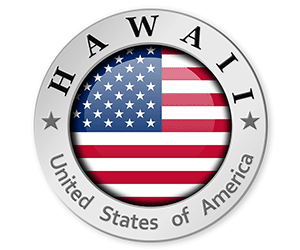Hawaii License Plate Lookup
How To Search License Plates in Hawaii
Hawaii, one of the smallest states by population, under 2 million people, has a very large car ownership population by percentage. This means there are a lot of people in Hawaii that need car related services such as vehicle record resources. Our Hawaii license plate lookup tool offers those resources to anyone living in Hawaii that can be accessed from a smartphone or computer. Many people that use this resource are trying to find out vehicle owner information, car history reports, vehicle specifications and if the vehicle has a clean title, to name a few. This tool offers a resource not offered by any motor vehicle department in Hawaii and is intended for unofficial, verification purposes. The first step in using the Hawaii license plate search tool is entering the full HI plate number into the search for and hitting enter. Then you will go through the terms of the search and make sure to select a acceptable reason for your plate search as only certain searches are allowed via state and federal privacy laws. Once you’ve satisfied those elements of the search you can proceed to the results. It’s also important to note that in the member’s area you can gain access to unlimited Hawaii license plate lookups and if you have an questions about your search you can reach out to support over the phone, email or blog. This is a powerful public record search tool that yields a lot of information, please search responsibly and review your Hawaii license plate search results to make sure you’ve found the right record for the correct vehicle. One digit or letter off can produce results for a completely different vehicle.
What Can Be Found With a Hawaii License Plate Lookup
- License plate owner information
- Complete history of the vehicle
- Vehicle options and specifications
- Vehicle title search
- Accidents and Recalls
- Odometer verification
- Sales history of the vehicle
- Vital statistics of the vehicle
Reasons for Running a Hawaii License Plate Search
People run a Hawaii license plate search for many different reasons. Here are a few of the most popular reasons people conduct this type of vehicle search:
- Researching a used car that someone wants to buy. Potential buyers can run a license plate search to verify the vehicle’s history, find the accident history, vehicle specifications, recalls and vehicle safety issues, and verify the title status and odometer readings. A VIN check can also be used to run a vehicle history report.
- Hawaii law enforcement agencies can conduct license plate searches during vehicle accident investigations, hit and run scenarios, or other traffic related incidents. This type of vehicle search can also provide important clues related to a crime, such as identifying a suspect’s vehicle seen at a crime scene or verifying the ownership of a recovered stolen or abandoned vehicle.
- Insurance companies can run a license plate lookup to validate the information provided by policyholders or during an auto insurance claim. For example, if there is a dispute about an accident, an insurance company might use a license plate search to find out more information about the vehicles involved.
- Private investigators might run a license plate search as part of their investigation, such as in cases of suspected fraud or in the process of skip tracing for individuals that are part of an ongoing court case.
- Cities might perform a license plate search to find the owner of a vehicle that has outstanding parking tickets or traffic violations.
- If someone witnesses dangerous driving or a hit and run incident, they might report the license plate number of the vehicles involved
Make sure that when running a Hawaii license plate lookup to adhere to the federal and state privacy laws. Some information may be limited depending on what your reasons are for looking up vehicle records in Hawaii. Make sure to use the information you obtain responsibly, it is illegal to harass or intimidate anyone with the vehicle records you obtain.
The History of License Plates in Hawaii
Once Hawaii became a US territory in 1898, vehicles were shipped to the Island the next year. Then until 1906, each island in the Hawaiian Island Chain independently registered and governed those vehicles separately. Then it wasn’t until the 1920’s when Hawaii standardized this process and began to issue license plates to all the islands and managing the vehicles and driver registrations from a central department. Until this time most of the islands did not issue license plates, it was up to the vehicle owner to provide their own. Then once Hawaii became an official state in 1959, the registration laws mirrored what other states did in the US. According to the Hawaii Department of Transportation there are over 470,000 vehicles registered in the state as of 2022.
Hawaii License Plate Requirements
Hawaii issues license plates to everyone in the state and only rear plates are required to be displayed. License plates are issued to all passenger cars, trucks, commercial trucks, RVs, SUVs and motorcycles. All vehicles in Hawaii need to have at least a license plate on the rear but it’s not necessary on the front of the vehicle. The rear plate must also display the registration stickers.
It is also important to note then when purchasing a new vehicle, there is a 30 day period in which the paperwork must be filed to obtain new plates. If you fail to do so then your vehicle may be impounded if you’re caught driving it on the road without current tags in your name. There are three ways of applying for a license plate: in-person, via mail and online. When you receive your new Hawaii license plates you will also receive new tags that must be displayed with the plate on the rear of the vehicle. If you are applying for specialized Hawaii plates then you will also need to get an additional registration sticker, the same rules apply for all Hawaii license plates.
Nationwide License Plate Searches
- Alabama
- Alaska
- Arizona
- Arkansas
- California
- Colorado
- Connecticut
- Delaware
- Florida
- Georgia
- Idaho
- Illinois
- Indiana
- Iowa
- Kansas
- Kentucky
- Louisiana
- Maine
- Maryland
- Massachusetts
- Michigan
- Minnesota
- Mississippi
- Missouri
- Montana
- Nebraska
- Nevada
- New Hampshire
- New Jersey
- New Mexico
- New York
- North Carolina
- North Dakota
- Ohio
- Oklahoma
- Oregon
- Pennsylvania
- Rhode Island
- South Carolina
- South Dakota
- Tennessee
- Texas
- Utah
- Vermont
- Virginia
- Washington
- West Virginia
- Wisconsin
- Wyoming

Hawaii License Plate Search FAQs
Can I search other state license plate numbers if I live in Hawaii?
Yes, since most vehicle information is public record, you can search any license plate in the United States. You will need to know the full plate number and state of registration and you can plug those into the SearchQuarry.com license plate search toolWhat is a Hawaii license plate lookup?
A Hawaii license plate lookup is used when someone wants to obtain vehicle records. Often this is performed by people who are in the market to buy a used vehicleHow can I run a Hawaii license plate lookup?
here are several ways to run a Hawaii license plate lookup. The most popular way is to run this type of search through a public record website. You can find a lot of vehicle information such as the vehicle history, vehicle title status, odometer verification, recalls and accident history.What can I find from a Hawaii license plate search?
You can find vehicle details such as make, model, year, VIN number, accidents or recalls, and limited vehicle owner information depending on what is allowed by state privacy laws.Is it legal to run a Hawaii license plate search?
Yes, it is legal to run a license plate search, but there are limitations on what personal information that can be obtained by the general public.Can I run a Hawaii license plate lookup to get a vehicle history report?
Yes, a license plate lookup can be used to get a vehicle history report, accident history and the vehicle title status. This can be very helpful when deciding to purchase a used car.Are all online Hawaii license plate lookup websites reliable?
Not all of them are, it is important to use a verified resource and make sure the website has a valid security certificate and has a good online reputation. Reading the website reviews can be helpful.Can a Hawaii license plate lookup tell me if a vehicle is stolen?
A license plate lookup may provide some information regarding a vehicle's status, but not all online vehicle resources record you if it has been stolen. You can also use the free government resource NMVTIS to find out if a vehicle has been reported stolen.Before Comments
Please be advised that the information accessed through SearchQuarry.com searches may not always be accurate or current, as we neither generate nor authenticate the data provided via our service. The reliability and precision of information are primarily contingent upon diverse public sources from which data is compiled. By utilizing SearchQuarry.com, you acknowledge your acceptance of the terms delineated in the SearchQuarry.com terms of service and our privacy policies. Information acquired via SearchQuarry.com must not be utilized for unlawful purposes such as stalking or harassing individuals, or scrutinizing public figures or celebrities. Individuals who contravene these directives may be subject to both civil and criminal legal proceedings and sanctions. It is explicitly stated that SearchQuarry.com does not function as a "consumer reporting agency" as defined by the Fair Credit Reporting Act ("FCRA"), and therefore, does not furnish "consumer reports" pursuant to the FCRA. SearchQuarry.com strictly prohibits the utilization of information garnered from search results (a) for discriminatory practices against any consumer; (b) for assessing a consumer's eligibility for personal credit, insurance, employment, housing, or government licenses or benefits; or (c) in any other manner that may impact a consumer's economic or financial status or standing.



Comments
Last Updated: 2023-05-18